Driving commercial and political engagement between Asia, the Middle East and Europe
Driving commercial and political engagement between Asia, the Middle East and Europe
Driving commercial and political engagement between Asia, the Middle East and Europe
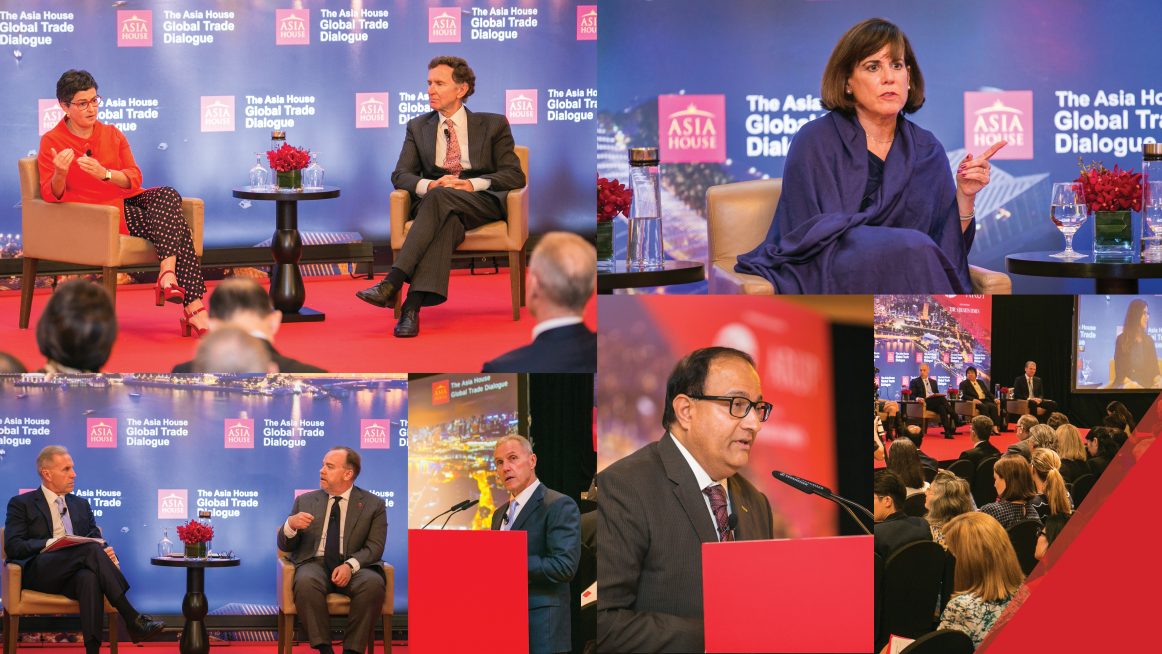
Asia House returned to Singapore in November 2019 to convene its major international conference: The Asia House Global Trade Dialogue. Senior figures from policy, technology, business and regulation took part in the forum, which brought together more than 350 delegates and media from around the world.
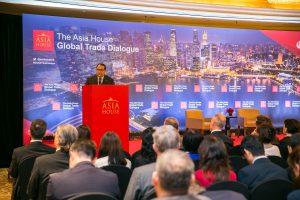 The spoils of the digital revolution must be shared equally to counter the rise of populism, Singapore’s Minister for Communications and Information said in a keynote speech at the conference. S Iswaran, who is also Minister-in-Charge of Trade Relations, warned that the effects of globalisation and digitisation are exerting pressure on jobs and businesses, leading to pushback against the current global system and “the rise of populist sentiments.” Following his speech, the Minister took part in a Q&A with Asia House Chief Executive Michael Lawrence.
The spoils of the digital revolution must be shared equally to counter the rise of populism, Singapore’s Minister for Communications and Information said in a keynote speech at the conference. S Iswaran, who is also Minister-in-Charge of Trade Relations, warned that the effects of globalisation and digitisation are exerting pressure on jobs and businesses, leading to pushback against the current global system and “the rise of populist sentiments.” Following his speech, the Minister took part in a Q&A with Asia House Chief Executive Michael Lawrence.
READ MORE AND WATCH SPEECH AND Q&A
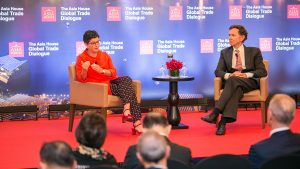 Governments around the world must invest in re-skilling their populations as the digital revolution transforms the global economy, Arancha González, Under-Secretary General, United Nations, said. In conversation with Lord Green, González, who also serves as Executive Director, International Trade Centre, urged policymakers to recognise the tech-driven changes taking place. If they don’t, “political support for open markets will gradually erode,” she warned. In a wide-ranging conversation, González also revealed ongoing debates within the World Trade Organization (WTO) around data and its implications, while Lord Green called for “a WTO which has strong arbitration, makes strong dispute resolutions, and is authoritative, so that counties around world respect its decisions and abide by them.”
Governments around the world must invest in re-skilling their populations as the digital revolution transforms the global economy, Arancha González, Under-Secretary General, United Nations, said. In conversation with Lord Green, González, who also serves as Executive Director, International Trade Centre, urged policymakers to recognise the tech-driven changes taking place. If they don’t, “political support for open markets will gradually erode,” she warned. In a wide-ranging conversation, González also revealed ongoing debates within the World Trade Organization (WTO) around data and its implications, while Lord Green called for “a WTO which has strong arbitration, makes strong dispute resolutions, and is authoritative, so that counties around world respect its decisions and abide by them.”
READ MORE AND WATCH SESSION IN FULL
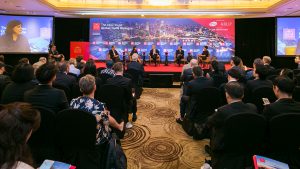 Senior figures from policy and investment shared their assessment of the global trade outlook during a session dominated by US-China tensions. Barbara Weisel, former US Trade Representative for Southeast Asia and the Pacific, raised concerns that the ‘phase one’ deal between Beijing and Washington “hasn’t touched what’s really at the heart of this, which is the tech war,” while Victor Gao, Vice President, Center for China and Globalization, defended China’s record of reform. Looking more broadly at the global environment, Victor Chu, Chairman and CEO, First Eastern Investments, shared his fears around investor confidence, while Anne Ruth Herkes, former State Secretary, German Ministry of Economic Affairs and Energy, identified RCEP as a cause for optimism.
Senior figures from policy and investment shared their assessment of the global trade outlook during a session dominated by US-China tensions. Barbara Weisel, former US Trade Representative for Southeast Asia and the Pacific, raised concerns that the ‘phase one’ deal between Beijing and Washington “hasn’t touched what’s really at the heart of this, which is the tech war,” while Victor Gao, Vice President, Center for China and Globalization, defended China’s record of reform. Looking more broadly at the global environment, Victor Chu, Chairman and CEO, First Eastern Investments, shared his fears around investor confidence, while Anne Ruth Herkes, former State Secretary, German Ministry of Economic Affairs and Energy, identified RCEP as a cause for optimism.
READ MORE AND WATCH SESSION IN FULL
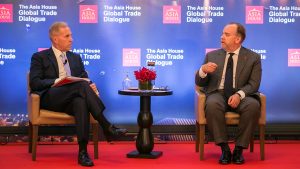 Global banking faces a “tremendous threat” from big data companies, the former Group CEO of HSBC, Stuart Gulliver, said during an interview with Asia House Chief Executive Michael Lawrence. Gulliver said challenges to the banking industry are “primarily coming not from FinTech, but big tech.” While digital innovation across personal finance will impact on retail banking, “big tech, the big platforms, absolutely are a threat to traditional banks,” he said. Gulliver cited the huge data pools that big tech companies have access to as a key area of concern for the banking sector, as these will enable tech platforms “to bank companies, particularly SMEs, that the traditional banking system would struggle to.”
Global banking faces a “tremendous threat” from big data companies, the former Group CEO of HSBC, Stuart Gulliver, said during an interview with Asia House Chief Executive Michael Lawrence. Gulliver said challenges to the banking industry are “primarily coming not from FinTech, but big tech.” While digital innovation across personal finance will impact on retail banking, “big tech, the big platforms, absolutely are a threat to traditional banks,” he said. Gulliver cited the huge data pools that big tech companies have access to as a key area of concern for the banking sector, as these will enable tech platforms “to bank companies, particularly SMEs, that the traditional banking system would struggle to.”
READ MORE AND WATCH SESSION IN FULL
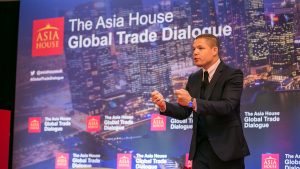 Dr David Hardoon, Special Advisor (Artificial Intelligence), Monetary Authority of Singapore, warned against an approach to data that would see innovation stifled in a lively presentation. Artificial Intelligence (AI) and machine learning technologies are already transforming the trade and investment landscape, he said. But a “growing trend globally” towards data localisation is a cause for concern. Echoing earlier comments made at the Asia House conference by Singapore’s Minister for Communications and Information, S Iswaran, Hardoon urged the corporate world to “stop referring to data as like oil, because it elicits this emotive response of ‘I need to keep this as close as possible’.”
Dr David Hardoon, Special Advisor (Artificial Intelligence), Monetary Authority of Singapore, warned against an approach to data that would see innovation stifled in a lively presentation. Artificial Intelligence (AI) and machine learning technologies are already transforming the trade and investment landscape, he said. But a “growing trend globally” towards data localisation is a cause for concern. Echoing earlier comments made at the Asia House conference by Singapore’s Minister for Communications and Information, S Iswaran, Hardoon urged the corporate world to “stop referring to data as like oil, because it elicits this emotive response of ‘I need to keep this as close as possible’.”
READ MORE AND WATCH SESSION IN FULL
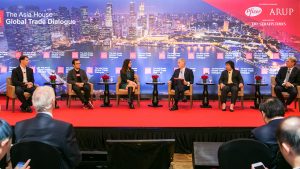 Southeast Asia’s internet economy will be worth US$300 billion by 2025, according to a new Google and Temasek report. Stephanie Davis, Managing Director of Sales and Operations for Southeast Asia, Google, said the growth rate of the region’s digital economy has hugely outstripped expectations. The speed of this transition will bring profound change, even to sectors that have traditionally been slow to embrace digitisation, Pierre Gaudreault, President, Asia Emerging Markets Region, Pfizer Biopharmaceuticals Group, suggested. “AI technologies and machine learning will accelerate that life cycle tremendously, and will be of huge benefit for patients and society,” he said. Data is, of course, at the heart of the digital economy. Fajrin Rasyid Co-Founder and President of the Indonesian unicorn Bukalapak, outlined their work partnering with banks and FinTech companies to facilitate data-driven financing to help SMEs grow, while Lay Lim Teo, Senior Managing Director of Accenture ASEAN, shared compelling case studies reflecting the change taking place. But data is, of course, an increasingly controversial and contested commodity, exposed to regulatory and political risk. For George Raymond Zage III, CEO of Tiga Investments and a member of Gojek’s Board of Commissioners, this presents a challenge to investors. “If you’re in a country that’s trying to hammer that [data] down, that would make me nervous.”
Southeast Asia’s internet economy will be worth US$300 billion by 2025, according to a new Google and Temasek report. Stephanie Davis, Managing Director of Sales and Operations for Southeast Asia, Google, said the growth rate of the region’s digital economy has hugely outstripped expectations. The speed of this transition will bring profound change, even to sectors that have traditionally been slow to embrace digitisation, Pierre Gaudreault, President, Asia Emerging Markets Region, Pfizer Biopharmaceuticals Group, suggested. “AI technologies and machine learning will accelerate that life cycle tremendously, and will be of huge benefit for patients and society,” he said. Data is, of course, at the heart of the digital economy. Fajrin Rasyid Co-Founder and President of the Indonesian unicorn Bukalapak, outlined their work partnering with banks and FinTech companies to facilitate data-driven financing to help SMEs grow, while Lay Lim Teo, Senior Managing Director of Accenture ASEAN, shared compelling case studies reflecting the change taking place. But data is, of course, an increasingly controversial and contested commodity, exposed to regulatory and political risk. For George Raymond Zage III, CEO of Tiga Investments and a member of Gojek’s Board of Commissioners, this presents a challenge to investors. “If you’re in a country that’s trying to hammer that [data] down, that would make me nervous.”
READ MORE AND WATCH SESSION IN FULL
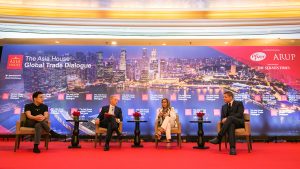 A recent report by McKinsey suggests that established banks risk becoming “a footnote of history” if they fail to embrace the opportunities emerging from FinTech. But how do disrupters and regulators anticipate the FinTech revolution playing out? Marjan Delatinne, Global Head of Banking, Ripple, said that, for big players, the need to change is “a question of survival at this stage.” For Eddie Lee, Regional Director of Operations, Revolut, collaboration is the way forward, while Dr David Hardoon, Senior Advisor (Artificial Intelligence), Monetary Authority of Singapore, predicted a shift in approach. “People need banking services. They don’t necessarily need banks,” he said. “I don’t think banks will become a footnote, but there will definitely be a change in what they look like and how they operate.”
A recent report by McKinsey suggests that established banks risk becoming “a footnote of history” if they fail to embrace the opportunities emerging from FinTech. But how do disrupters and regulators anticipate the FinTech revolution playing out? Marjan Delatinne, Global Head of Banking, Ripple, said that, for big players, the need to change is “a question of survival at this stage.” For Eddie Lee, Regional Director of Operations, Revolut, collaboration is the way forward, while Dr David Hardoon, Senior Advisor (Artificial Intelligence), Monetary Authority of Singapore, predicted a shift in approach. “People need banking services. They don’t necessarily need banks,” he said. “I don’t think banks will become a footnote, but there will definitely be a change in what they look like and how they operate.”
READ MORE AND WATCH SESSION IN FULL
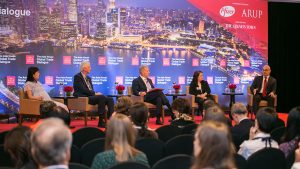 Asia is urbanising rapidly, with 350 million more people expected to be living in its cities by 2035. This trend will place pressure on current infrastructure and bring fresh challenges for city planners and policymakers – from issues around sustainability to the task of attracting talent. With climate change among the main risks facing Asia’s future cities, Peter Chamley, Chair, Arup Australasia, said a focus should be on resilience, while Yasser Helmy, Head of Smart and Connected Communities, Asia Pacific, Cisco, called for cities to have a vision which drives all areas of planning. Looking ahead, Alibaba Cloud’s Senior Product Lead, Jessie Yu, shared details of the “next phase of smart cities,” and Aileen Zosa, Executive Vice President of the Bases Conversion and Development Authority, The Philippines, spoke on the use of facial recognition tech in New Clarke City.
Asia is urbanising rapidly, with 350 million more people expected to be living in its cities by 2035. This trend will place pressure on current infrastructure and bring fresh challenges for city planners and policymakers – from issues around sustainability to the task of attracting talent. With climate change among the main risks facing Asia’s future cities, Peter Chamley, Chair, Arup Australasia, said a focus should be on resilience, while Yasser Helmy, Head of Smart and Connected Communities, Asia Pacific, Cisco, called for cities to have a vision which drives all areas of planning. Looking ahead, Alibaba Cloud’s Senior Product Lead, Jessie Yu, shared details of the “next phase of smart cities,” and Aileen Zosa, Executive Vice President of the Bases Conversion and Development Authority, The Philippines, spoke on the use of facial recognition tech in New Clarke City.
